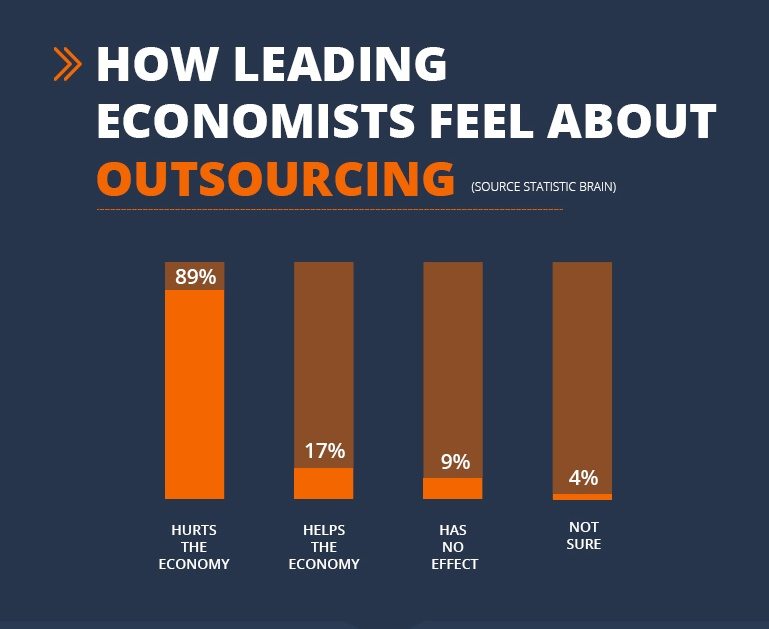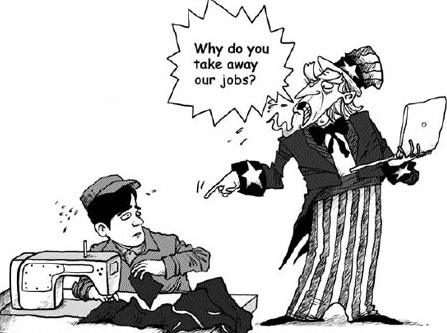Introduction
It's a hotly contested topic of how outsourcing affects the U.S. economy. Because of the cost savings it brings to businesses, the increased chances for American entrepreneurs, and the increased number of Americans who can advance in their careers, this practice is seen as beneficial to the U.S. economy by many on the political right. Those who oppose the practice argue that it directly impacts the U.S. economy by depriving many Americans of employment opportunities, especially among the semi- and highly skilled. Tax policies that consider corporations' use of outsourcing have the potential to reduce corporate tax debt and, by extension, federal spending.
How outsourcing jobs affects the economy
Through outsourcing, U.S. companies can compete more effectively on a global scale. They can now sell in airports and shopping centres with international sections. And by finding work in the developing world, where wages are lower, they save even more money. That means less money is spent on shipping things back to the U.S. Outsourcing has a negative impact on the U.S. economy since it increases unemployment.
According to research into the effects of outsourcing, increased U.S. unemployment is the most significant drawback. Almost twice as many jobs were sent overseas as were lost to outsourcing, totaling 14 million. It would be enough to choose 5.7 million Americans currently working part-time but seeking full-time employment if job offers were to come back.
The impetus for offshoring
Outsourcing has always been met with resistance, whether done to avoid unions, take advantage of cheap labour in other locations, or leverage giant contractors' better experience and efficiencies. Regardless of the cause, when one person finds work, someone else loses it, often to a foreigner working for far less pay. The distance between the two and the pay differential between the old and new jobs appear to be the two most significant factors in the intensity of the anger. Consumers and investors have provided the drive for outsourcing, made possible by technological and expertise advances. Competition from imports, a trend that began in the late 1970s and accelerated in the 1990s with the opening of trade with China, India, and Eastern Europe, pushed American businesses to develop new, more efficient methods of operation.

Technology Outsourcing
In the information technology industry, many American corporations are outsourcing to India and China due to the similarities in capabilities and the far lower pay. Tech positions in Silicon Valley are often offered to foreign nationals on H-1B visas.
Call Centre Outsourcing
Numerous call centres have been moved to India and the Philippines during the past two decades. Because all the locals speak fluent English, that's why. However, that's starting to change. The wage gap between the United States and emerging markets is significantly narrower in the call centre industry than in the technology sector.
Domestic Outsourcing:
There has been some discussion, in tandem with the rise of domestic outsourcing, of the rise of independent contractors engaged in nonstandard work arrangements that mirror the deteriorating quality of jobs for low-wage workers and the growth of industries that are not subject to labour law. Independent contractors made up a smaller share of the labour force in 2017, according to the Contingent Worker Supplement to the Current Population Survey. It's a weekly survey that asks about the previous week at work and is focused on the primary job so that it won't catch income from freelance work or other part-time gigs. Research suggests that many already employed people are also working as independent contractors or in the gig economy to supplement their income. Therefore the amount of nonstandard work may be smaller than was previously thought.
Loss of Manufacturing Capacity
When businesses leave for cheaper labour elsewhere, we lose expertise and the ability to produce goods here at home. For instance, the United States was formerly the world leader in solar cell production. Still, many American solar technology businesses, such as Germany, have moved their operations to nations with more generous incentives. The ability to produce goods domestically has been lost. Even if the United States were to bring these industries back home, retooling factories and educating engineers would take a long time.
Reliance on Foreign Relations
The potential for relations with other countries to shift is another threat to outsourcing businesses. In a trade war between the United States and China, the Chinese government could implement taxes on the import and export activities of international corporations based in China. Many American businesses were forced to completely restructure their activities abroad after the 1996 passage of the Helms-Burton Act prohibited them from conducting business with Cuba.

Conclusion:
Although it helps American businesses remain competitive by keeping costs down, outsourcing jobs has a negative impact on the labour market in the United States. Americans have lost their employment to countries with lower labour costs, such as China, Mexico, and India. U.S.-based businesses have also been increasingly reliant on freelancers, temp workers, and part-timers as a kind of outsourcing. Some American labourers have been displaced by robots as well.











